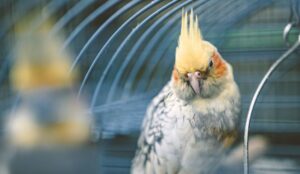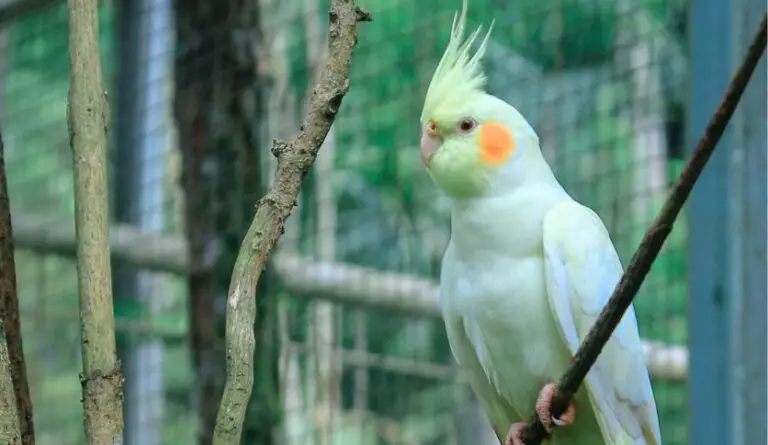A cockatiel cage should be at least 24 inches wide and 24 inches tall. A proper-sized cage is essential for a cockatiel’s well-being.
Not only does it provide enough space for them to move around and exercise, but it also includes essential accessories like perches, toys, and food bowls. Adequate space prevents stress-related behaviors, overcrowding, and wing injuries. Remember that cockatiels are active birds that require mental stimulation and physical exercise.
Providing them with a larger cage allows them to fly and explore their surroundings. Ensuring your cockatiel has enough room promotes a healthy and fulfilling environment for their overall happiness and longevity.
Why Cage Size Matters For Cockatiels
Cage size is of utmost importance when it comes to providing a suitable living space for your beloved cockatiel. The size of the cage directly affects their physical and mental well-being.
Physically, a small cage can restrict their movement and hinder their ability to spread their wings and fly. This can lead to muscle atrophy and other health issues. Mentally, cramped space can cause stress and anxiety, leading to behavioral problems like feather plucking or excessive screaming.
Choosing the perfect cage size for your cockatiel requires careful consideration. The cage should be spacious enough for the bird to move around comfortably, with room for perches, toys, and feeding dishes. Generally, the cage should be at least 20 inches wide, 20 inches deep, and 24 inches tall. However, larger cages are always better, providing more room for exercise and exploration.
| Recommended Cage Size (Minimum) | 20 inches wide | 20 inches deep | 24 inches tall |
|---|
Adequate space in the cage allows cockatiels to engage in natural behaviors like climbing, playing, and exploring their surroundings. Providing a spacious and comfortable environment contributes significantly to their overall health and well-being.
Understanding Cockatiel Behavior And Space Requirements
| Cockatiels’ natural behavior in the wild: | Cockatiels are native to Australia and are known for their friendly and active nature. In the wild, they spend significant time flying and foraging for food. They are highly social birds and generally live in flocks. |
| The need for flight and exercise in captivity: | When kept in captivity, providing cockatiels with ample opportunities for exercise and flight is crucial. Regular flying helps to keep them physically fit and mentally stimulated. They may become stressed or exhibit behavioral problems without enough space to stretch their wings. |
| The space requirements for cockatiels to thrive: | A suitable cage for a cockatiel should be spacious enough for them to move around comfortably, flap their wings, and engage in natural behaviors. The general rule of thumb is that the cage should be at least 20 inches wide, 20 inches deep, and 24 inches tall. It should also have horizontal bars that allow the bird to climb and exercise. Additionally, cockatiels should have regular out-of-cage time in a secure and supervised environment. |
Cockatiels thrive in an environment that allows them to fly and exercise freely. Understanding their natural behavior and providing a sufficiently spacious cage is essential for their well-being and overall happiness.
Determining The Ideal Cage Dimensions For Cockatiels

The size of the cage is a crucial factor to consider when providing a comfortable living space for your cockatiel. The cage should meet the minimum size standards recommended by experts for a single cockatiel. These standards suggest cage dimensions of at least 20 inches in height, 20 inches in length, and 18 inches in width.
However, various factors must be considered when determining the ideal cage size for your cockatiel. Consider their size and wingspan, as they need enough room to move around and stretch their wings. If you plan to house multiple cockatiels together, make sure to provide ample space to prevent overcrowding and territorial conflicts.
In addition to size, toys, perches, and feeding stations are vital for the bird’s mental and physical stimulation. You should calculate the total space required by considering these elements as well.
Providing a spacious and well-equipped cage is essential for the health and well-being of your cockatiel. By considering these factors and calculating the ideal dimensions, you can create a comfortable and stimulating environment for your feathered friend.
Choosing A Cage Style That Meets Cockatiel Needs
Choosing the right cage size for your cockatiel is essential to ensure its well-being. There are a few factors to consider when considering the different cage styles available.
| Types of cages suitable for cockatiels |
| – Flight cages |
| – Wire and bar spacing considerations |
| – Materials that are safe and durable for cockatiels |
| – Cage features to prioritize for cockatiel comfort |
| – Door size and placement for easy access |
| – Removable trays for effortless cleaning |
| – Security measures to prevent escapes and injury |
Flight cages provide ample space for your cockatiel to move and exercise. In terms of wire and bar spacing, ensure that it is narrow enough to prevent your feathered friend from getting stuck but wide enough for them to climb comfortably. Opt for cages made from safe and durable materials such as stainless steel or powder-coated metal. Features prioritizing your cockatiel’s comfort include perches, food and water dishes, and toys. Easy access through appropriately sized doors is essential for cleaning and interacting with your pet. A removable tray simplifies cage maintenance while employing security measures like sturdy locks and escape-proof latches can prevent accidents.
Setting Up The Perfect Cockatiel Environment Within The Cage
Setting Up the Perfect Cockatiel Environment within the Cage
Creating a proper home for your cockatiel involves various factors contributing to its well-being. Optimal cage placement in your home should be considered to ensure your pet feels safe and secure. Finding an area away from drafts and direct sunlight is important, as extreme temperatures can be harmful. Additionally, providing a consistent temperature and appropriate lighting is crucial for your cockatiel’s health. Consider the importance of natural sunlight or UV lighting, as they provide essential vitamins for your bird’s overall well-being.
Furnishing the cage appropriately promotes stimulation and enrichment. Providing appropriate perches is vital for exercise and foot health. Different types of perches with varying textures and diameters will help keep your bird’s feet strong and healthy.
Engaging your cockatiel with various types of toys is essential for their mental and physical stimulation. Different textures, shapes, and sounds will keep them entertained and engaged. Make sure to rotate toys regularly to avoid boredom and constantly provide new stimuli.
Feeding stations and water dispensers should be easily accessible for your bird. Consider using materials that are easy to clean and replace. Setting up the perfect cockatiel cage creates a safe and comfortable home for your feathered friend, ensuring their overall well-being and happiness.
Maintenance Tips For Cockatiel Cages
Regular cleaning routines are essential to maintain a healthy habitat for your cockatiel. Cleaning the cage at least once a week is recommended to prevent bacteria and dirt buildup. When cleaning, ensure to use safe cleaning products that are made explicitly for bird cages to avoid any harmful residue.
To deal with cage odor and waste management, it is important to clean the droppings tray and any soiled bedding or perches regularly. This will help reduce the smell and prevent the spread of bacteria. Regularly inspecting the cage structure and accessories is also necessary to identify and address any potential safety hazards.
If you notice any damaged or worn-out components, such as broken bars or toys, it is crucial to replace them immediately to prevent injury to your pet. Cockatiels are curious birds, and they may chew on their surroundings, so it’s important to watch for any potential hazards.
| Regular Cleaning Routines | Safe Cleaning Products | Dealing with Odor and Waste |
|---|---|---|
| Clean cage at least once a week | Use bird cage-specific cleaning products | Clean droppings tray and soiled bedding regularly |
Remember, a clean and well-maintained cage provides a healthy and safe environment for your cockatiel to thrive in. By following these maintenance tips, you can ensure your pet’s well-being and enhance your bond with them.
Understanding Your Cockatiel’s Needs Beyond Cage Size
To provide a healthy and comfortable environment for your cockatiel, it’s important to consider more than just the size of their cage. While cage size is certainly a crucial factor, other aspects of your cockatiel’s needs should not be overlooked.
One important aspect to consider is the need for out-of-cage time. Cockatiels are social creatures and require regular interaction to fulfill their mental and physical needs. Designating a safe and supervised play area where your cockatiel can explore and exercise is essential. This area should be free from potential hazards and dangers.
Additionally, providing social interaction and mental stimulation is key to a happy cockatiel. Spending quality time with your bird, whether through talking, playing, or teaching new tricks, can go a long way in keeping them engaged and content.
Creating a cockatiel-friendly household is also crucial. This includes avoiding exposure to toxic fumes, such as those from non-stick cookware or aerosol sprays. It is important to ensure your cockatiel’s living environment is clean and free from potential dangers.
Furthermore, a healthy diet and proper nutrition are vital for your cockatiel’s overall well-being. Offering a balanced diet consisting of high-quality pellets, fresh fruits, vegetables, and occasional treats can help maintain their health and prevent nutritional deficiencies.
Regular veterinary check-ups and following recommended care guidelines are essential to ensure your cockatiel’s health. A veterinarian specializing in avian care can guide proper nutrition, grooming, and overall healthcare.
Frequently Asked Questions On How Big Should A Cockatiel Cage Be
Can A Cockatiel Cage Be Too Big?
Yes, a cockatiel cage can be too big. Optimal cage size allows room for movement while preventing injury. A cage that’s too large might make it difficult for the bird to navigate and find food or water. It’s important to choose a cage that’s appropriate for the bird’s size and needs.
What Cages Are Best For Cockatiels?
The best cages for cockatiels are spacious, with plenty of room for flying and exercising. Look for cages made of sturdy materials, such as stainless steel, with horizontal bars for climbing. Provide perches and toys to keep your cockatiel entertained and engaged.
What Do Cockatiels Like In Their Cage?
Cockatiels like various things in their cage, such as toys for mental stimulation, perches for exercise, and a cozy spot to sleep. Providing fresh food, water, and a clean environment are also essential for their well-being.
What Size Cage Do Cockatiels Need?
Cockatiels need a cage at least 20 inches wide, 20 inches tall, and 24 inches deep. This provides enough space for them to move around and stretch their wings comfortably.
Conclusion
To ensure the well-being of your cockatiel, providing the right size cage is crucial. A spacious cage allows for natural movement and exercise, promoting physical and mental health. Balancing your bird’s needs with the available space in your home is essential.
Remember, a bigger cage is always better. Give your feathered friend room to stretch their wings, hop around, and explore their surroundings. Investing in an appropriately sized cage contributes to your cockatiel’s overall happiness and longevity.

Hi, I’m Regina Rios. Just another bird lover who loves to share knowledge from personal experience. I’ve grown up with pet birds since childhood as my mommy also loves birds. As I can’t pet many birds in open air in my house as my mom does; I created my first bird cage on my rooftop using wood, copper wire, and a metal shed in 2018 and start collecting pet birds. Now, I have so many pet birds such as Macaws, Parrot, Cockatiel, Parakeet, and others. Not only that, if I see natural birds are injured I keep them in my house until they get well. Now, my hobby becomes my income source as my home birds have babies and I sell them to birds lover like mine. I’ve created this blog to inspire others bird owners by sharing my personal knowledge. Good Luck!


